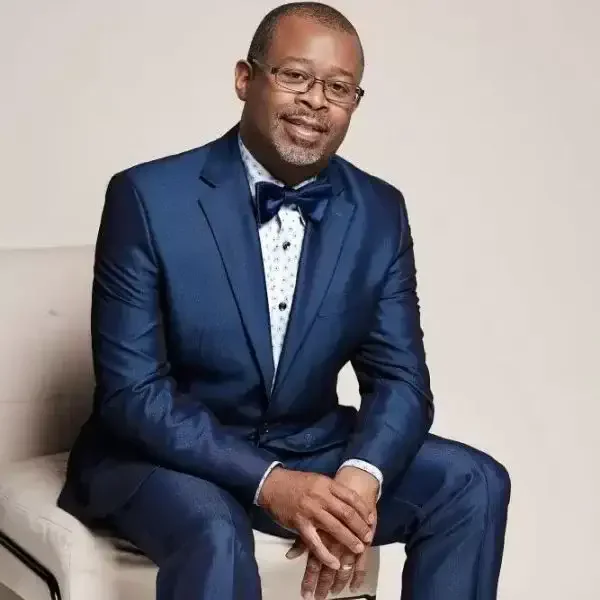Composer Bio
(born 1975) Subito – ASCAP
Artist’s Statement: “I want to compose music to reach to the inner soul of the listener that elevates them irregardless of race and religious affiliation.” —- James Lee III
Called a “gifted young composer” (Cincinnati Enquirer) whose “bright, pure music” (Washington Post) is “tonal but highly complex” (South Florida Classical Review) and “vibrant [and] richly layered” (Baltimore Sun), James Lee III composes in every medium ranging from orchestral and band works, to chamber ensemble, sacred choral and vocal pieces, and works for solo piano. Born in St. Joseph, Michigan, Lee is a “son” of the Great Lakes State having received an undergraduate degree in piano performance, and both his masters and doctorate degrees in composition all from the University of Michigan. His primary composition teachers included William Bolcom, Bright Sheng, and Michael Daugherty.
As a child, Lee had a passing interest in music; but, having been raised in the Seventh-day Adventist Church, he was regularly exposed to it. His faith provided an early window into his creativity, so biblical teachings—especially from the books of Daniel and Revelation—are an important inspiration for his music. At the age of 12, Lee began taking piano lessons which awakened an interest and talent that would become the driving force in his life. Robert Schuman’s Piano Concerto was among the first scores that he studied. At 16, he started composing while at the Andrews Academy (at Andrews University, Berrien Springs, Michigan), where he twice won talent shows playing his own piano compositions. This was followed by several other young composer awards. Lee also sang in school choirs, gaining an affinity for choral music. He attended university concerts and was so fascinated by different musical voices that he began to study scores by Ottorino Resphigi, John Adams and Olivier Messiaen. After graduating from the Academy, Lee continued his piano studies at Andrews University, and then transferred to the University of Michigan. After completing his undergraduate and advanced studies, Lee took up the post of Associate Professor of Composition and Theory at Morgan State University (Baltimore, Maryland).
In 2001, Lee’s work Papa Lapa was selected as one of four winners of the Detroit Symphony’s Emerging African American Composers Competition. Written as the composer’s master’s thesis, Papa Lapa received its first public reading by the Detroit Symphony led by Thomas Wilkins. In the summer of 2002, Lee was awarded a composer fellowship to the Tanglewood Music Center (Lenox, Massachusetts), where his string quartet The Appointed Time was premiered during the Tanglewood Music Festival. While at Tanglewood, he worked with composers Osvaldo Golijov, Michael Gandolfi, Steven Mackey, Kaija Saariaho, and Augusta Reed Thomas, and with conductor Stefan Asbury. In 2003, Lee received a Charles Ives Scholarship from the American Academy of Arts and Letters, and was honored again in 2010 when he was named a recipient of the Wladimir and Rhoda Lakond Award for young and mid-career composers.
October 2006 was a defining moment in Lee’s career when the National Symphony gave the world premiere of his orchestral work Beyond Rivers of Vision at the Kennedy Center in Washington, DC. Conducted by music director Leonard Slatkin, the three-movement, 14-minute piece was written as part of the composer’s doctoral dissertation. Based on an introduction from his former teacher William Bolcom, Lee emailed Slatkin to inquire about a possible meeting. Slatkin replied and provided him with two possible dates. Lee chose the earlier date later noting “I was actually very fortunate, because that time was actually one week before he [Slatkin] was going to formalize the next season….” So, Lee met with Slatkin in February; and, two days after receiving the score from the composer, Slatkin programmed the piece on the orchestra’s subscription concert-series. Slatkin’s reaction to Lee’s score was chronicled in the Baltimore Sun: “When James came to see me, what I found was somebody who clearly knows what he wants both musically and orchestrationally…I found the work not only engaging and colorful, but also deeply moving.” Slatkin subsequently took Beyond Rivers of Vision to the Detroit Symphony in 2010, after becoming the orchestra’s music director. (The Detroit Symphony Orchestra first performed Beyond Rivers of Vision in November 2008 as part of an educational concert conducted by Thomas Wilkins.)
After Beyond Rivers of Vision premiered, other notable performances followed. Lee’s well-respected chamber work Into Sonic Horizons received its first hearing at Morgan State University in February 2007. Scored for flute, clarinet, and piano, the work was written for the Morgan Chamber Players’ inaugural program and featured the composer at the piano. In December 2008, after becoming the Detroit Symphony music director, Slatkin conducted the world premiere of Lee’s four-movement symphonic work A Different Soldier’s Tale. Lee’s most recent premieres include: Chuphshah! Harriet’s Drive to Canaan—a 12-minute Baltimore Symphony-commission based on American heroine Harriet Tubman—led by Marin Alsop in September 2011; the October 2011 first performance of Sukkot Through Orion’s Nebula—a Sphinx Organization co-commission—given by Michael Tilson Thomas and the New World Symphony (Miami, FL) with subsequent 2012 performances by Sphinx orchestral-partners the Cincinnatti and Grand Rapids Symphonies; and the 2012 premiere of the chamber work Night Visions of Kippur by the Ritz Chamber Players at the University of Washington (Seattle) World Series.
Lee’s 2012-13 season brings the world premiere of Sonata No. 2 for Piano by pianist Rochelle Sennet at the Krannert Center for the Performing Arts (Urbana-Champaign, Illinois), and continuing performances of the Sphinx-commissioned work Sukkot Through Orion’s Nebula by the Akron and Detroit Symphonies.

